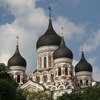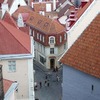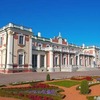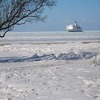Estonia mourns ex-president Lennart Meri
The first president of Estonia after it regained its independence from the Soviet Union, Lennart Meri, has died in the capital, Tallinn, aged 76.
A writer, dramatist and film-maker, Meri spent part of his childhood in Siberia after his family was deported.
After publishing works on Estonian history and culture, he was drawn into politics as the revolt against communism gained strength in the 1980s.
Mr Meri served two terms as president of Estonia, from 1992 to 2001.
"In his nine years as head of state, Meri both restored the presidency and built up the Republic of Estonia in the widest sense," said his successor, President Arnold Ruutel, in a speech on national television.
His works helped preserve and strengthen Estonian identity under an alien totalitarian regime
Estonian President Arnold Ruutel
He died early on Tuesday morning in a hospital in Tallinn "after a long and serious illness", the president's office said in a statement.
Last August he underwent an operation for brain cancer.
He was born in Tallinn in 1929, but in 1941 his family were among the many people from the Baltic states deported to Siberia under Soviet leader Joseph Stalin.
Mr Meri's family eventually found their way back to Estonia.
Foreign acclaim
The future president was banned from working as a historian by the Soviets, and became a playwright in the theatre and for radio.
He also wrote books and made films. Some were banned by Moscow but earned acclaim abroad.
"His works helped preserve and strengthen Estonian identity under an alien totalitarian regime," said President Ruutel.
Tributes poured in from Estonia's neighbours.
Latvian President Vaira Vike-Freiberga said "the world has lost a great Estonian, a great statesman and a true European".
Finnish President Tarja Halonen said: "The Finnish nation lost in Lennart Meri a close and sincere friend and the world, a great statesman who was one of the leading architects of the post-Cold War world."





